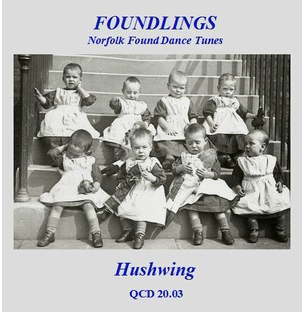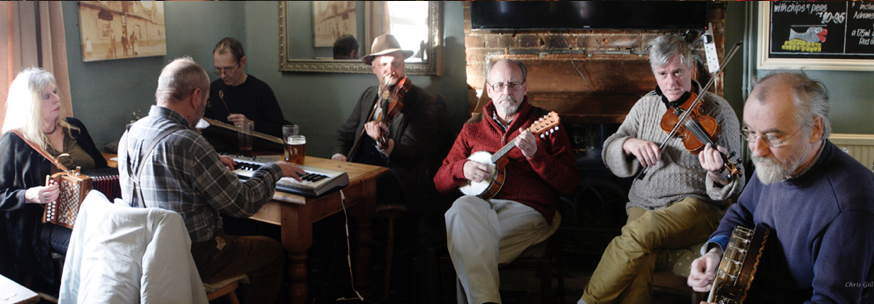review by Simon Haines
 On first listening to this recording made by East Anglian musicians, it took me back to music I’d first heard and been thrilled by in the mid-1970s: The Old Swan Band’s first recording: No Reels. Until that point I’d been a folk rock fan obsessed by the music of the Albion Dance Band, specifically the sophisticated drum and bass dominated The Prospect Before Us. That is still one of my favourite albums, but the appearance of No Reels sent me to music from older Topic label recordings: English Country Music (1965) and Country Music from East Anglia (1973). I felt that this was music that would have been played by the people of my grandparents’ and great-grandparents’ generation and I identified with it.
On first listening to this recording made by East Anglian musicians, it took me back to music I’d first heard and been thrilled by in the mid-1970s: The Old Swan Band’s first recording: No Reels. Until that point I’d been a folk rock fan obsessed by the music of the Albion Dance Band, specifically the sophisticated drum and bass dominated The Prospect Before Us. That is still one of my favourite albums, but the appearance of No Reels sent me to music from older Topic label recordings: English Country Music (1965) and Country Music from East Anglia (1973). I felt that this was music that would have been played by the people of my grandparents’ and great-grandparents’ generation and I identified with it.
No surprise then that Foundlings (Norfolk Found Dance Tunes), a 21-track CD by Hushwing Village Big Band, brought back happy musical memories and at the same time introduced me to unfamiliar tunes. Although many of the tunes would have been played all over the country, Hushwing have chosen tunes originally played and recorded by Norfolk musicians Walter Bulwer, Harry Cox, Sam Larner, Billy Cooper, Stephen Poll, Herbert Smith, George Watson, Walter Pardon. A number tunes are attributed to “Gressenhall” and are taken from a suite written by Francis Cunningham Woods, a London musician who visited the Norfolk village of Gressenhall and reworked tunes he’d heard being played on the accordion (melodeon?) by an unnamed local millworker.
For me the stand-out tracks on Foundlings are Moneymusk / Harry Cox’s Jig, Egbert Thorn’s Jig / Ward the Pirate, Walter Bulwer’s Polkas 3 and 4 (they make a change from the more commonly played 1 and 2!) and Cliff Hornpipe / Yarmouth Hornpipe. They are no better in themselves than the rest but I like a tune I can whistle or sing along to after hearing it just a couple of times. There are many such tunes on Foundlings.
Here is track 11, Harry Cox's Schottisches:
The Hushwing line-up is Richard Blake (dulcimer), Dave Devlin (fiddle and banjo), Chris Holderness (fiddle), Cass Devlin (melodeons), Alan Helsdon (piano), David Reeves (fiddle), Phil Williams (mandolin and whistles) - all excellent musicians playing music they clearly love. Most of the music is played by the full band, as would probably have been the case with the kind of ‘village big band’ they emulate. Photo by Chris Gill
Photo by Chris Gill
Throughout the recording the playing itself is fresh and spontaneous - for me a welcome antidote to the overproduced error-free but sometimes sterile recordings of the more well-known virtuoso folk musicians of today. To say that this recording represents the kind of music ordinary musicians would have played, might sound patronising, but I sometimes think that the amount of time today’s professionals spend on recordings and the amount of clever technology they use to make their music error-free drives the life out their music. In his notes accompanying the 1965 Topic album, Reg Hall writes: "In selecting particular tracks for this record, we have been compelled to seek out those performances with the best starts and finishes and with the fewest mistakes." Hushwing say something similar in their Foundlings notes: "These were not spotless performances in terms of recording studio multi-take perfection. …These were lively, ready-for-dancing performances; the result of reproducing this music many times over the years. It was almost as much a social event as a musical collaboration. Hushwing have met and practised these gems, and usually get the start right and often finish together. We've even left a few "mistakes" in for verisimilitude and, playing tunes from all over Norfolk and from many different musicians, we have tried to capture some of the excitement of the music of the early Topic recordings." These are sentiments I appreciate and admire. Until the modern era, traditional music was an integral part of the community its players were part of. The events they played for were indeed social events at which they provided a service for the people they knew and lived among. (Note: I expressed similar thoughts in an article I wrote in January 2020 for Living Tradition Magazine - reprinted HERE.)
Having said that, this recording reminds me of a well-organised session in which all the musicians know what they are playing but no one tries to dominate. I feel like getting my melodeon out and joining in.
If you are folk musician interested in English dance music and looking for new things to learn, this recording will provide you with loads of reasonably straightforward tunes to play. I wish it had been available 40 years ago when I was learning to play.
The album comes with a well-researched booklet of notes, providing detailed information about the source musicians and their tunes.
You can purchase a copy for £12 including postage from Quanting.

